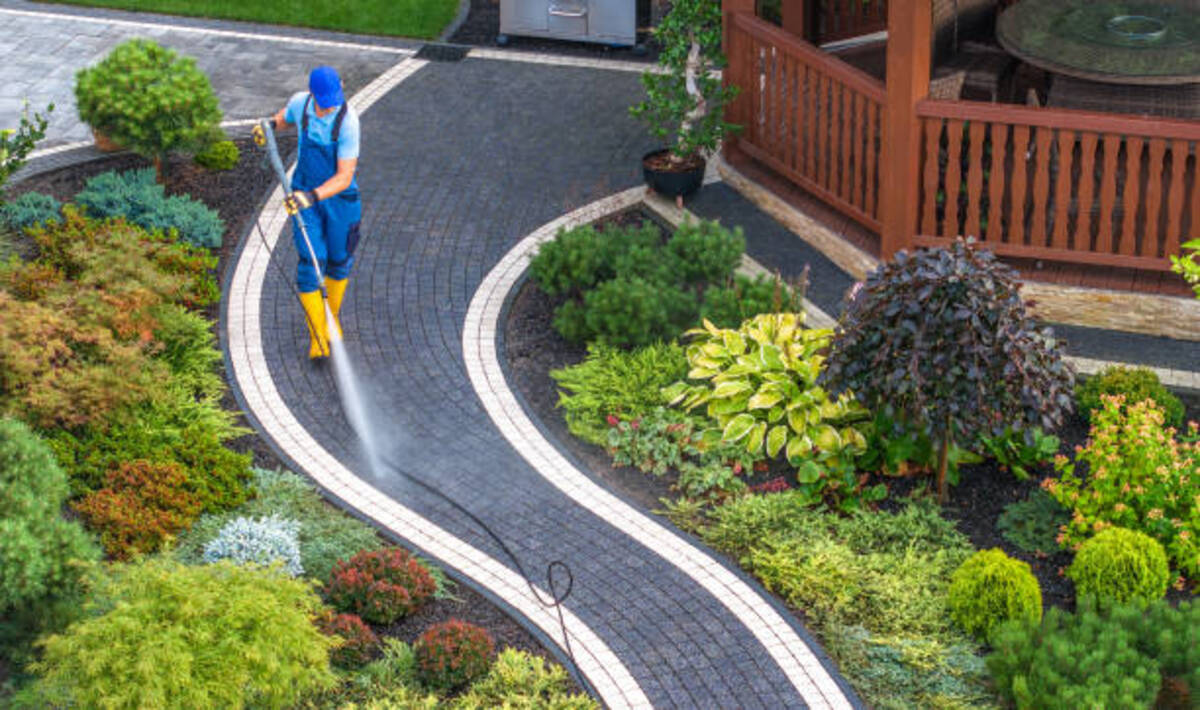When it comes to keeping your property pristine, pressure washing is an essential tool. Whether you’re a homeowner, a business, or a property manager, maintaining clean surfaces not only improves curb appeal but also extends the lifespan of your structures. This guide will take you through everything you need to know about pressure washing, from its benefits to best practices, ensuring your surfaces stay spotless and free from grime.
What is Pressure Washing?
Pressure washing, also known as power washing, is the process of using high-pressure water spray to remove dirt, mold, grime, and other unwanted substances from surfaces such as buildings, vehicles, and concrete. This cleaning method is particularly effective for tough stains and buildup that traditional cleaning methods may not remove. The equipment used in pressure washing typically includes a motor-driven pump that increases water pressure through a hose and nozzle. Depending on the application, various pressure levels and nozzle types can be adjusted to optimize the cleaning process.
The Benefits of Pressure Washing
Enhances Curb Appeal
One of the most immediate advantages of pressure washing is its ability to boost your property’s visual appeal. Over time, surfaces accumulate dirt, mold, and mildew, which can dull the appearance of your home or commercial building. Pressure washing brings surfaces back to life, making them look fresh and well-maintained.
Prevents Damage
Contaminants like mold, algae, and dirt can cause structural damage if left untreated. For example, mold can erode wood, and algae can weaken concrete. Regular pressure washing removes these harmful substances, preventing them from degrading your property and avoiding costly repairs in the future.
Saves Time and Effort
Compared to traditional cleaning methods, pressure washing is much faster and more efficient. With the right equipment, you can clean large areas in a fraction of the time it would take with a brush, soap, and water. Additionally, high-pressure water eliminates the need for harsh chemicals, making it an environmentally friendly cleaning solution.
Increases Property Value
Pressure washing not only keeps your property looking great, but it can also increase its market value. Buyers are more likely to be interested in a property that looks well-maintained, and clean surfaces play a huge role in making a positive first impression.
Common Surfaces to Pressure Wash
Driveways and Sidewalks
These surfaces are prone to accumulating oil stains, tire marks, and general grime. Pressure washing driveways and sidewalks restores their original color and texture, making them look new again.
Decks and Patios
Wooden decks and stone patios can develop moss, mildew, and algae over time. Pressure washing these areas can help preserve the material, preventing rot in wooden decks and ensuring stone patios remain structurally sound.
Siding
The exterior of your home is exposed to the elements all year round, leading to dirt buildup and potential mold growth. Pressure washing vinyl, brick, or wood siding is an excellent way to maintain the appearance and integrity of your home’s exterior.
Fences
Pressure washing fences, especially wooden ones, removes built-up dirt and grime, extending the lifespan of the material. It can also prepare the surface for new paint or stain, ensuring it adheres properly.
Roofs
While roofs are often overlooked, they accumulate debris such as leaves, dirt, and algae, which can compromise their structure. Soft-washing, a low-pressure method of cleaning roofs, can help preserve roofing materials without causing damage.
Types of Pressure Washers
There are two primary types of pressure washers: electric and gas-powered.
Electric Pressure Washers
Electric pressure washers are ideal for small to medium-sized jobs. They are typically quieter and more lightweight than their gas-powered counterparts, making them perfect for residential use. Electric pressure washers are also easier to maintain and operate but may lack the power needed for heavy-duty cleaning.
Gas-Powered Pressure Washers
Gas-powered pressure washers are more suitable for commercial or large-scale projects. These machines are more powerful, allowing for faster cleaning of large areas or heavily soiled surfaces. However, they require more maintenance and produce more noise and emissions compared to electric pressure washers.
How to Choose the Right Pressure Washer
When selecting a pressure washer, it’s important to consider pounds per square inch and gallons per minute. The PSI determines how much pressure is applied to the surface, while the GPM indicates the amount of water used per minute.
Pressure Washing Safety Tips
While pressure washing is an effective cleaning method, it also poses risks if not done correctly. Here are some safety tips to ensure you clean your surfaces without causing harm to yourself or your property:
- Wear protective gear, including goggles and gloves, to shield yourself from water and debris.
- Avoid spraying directly at people, pets, or electrical outlets.
- Use the correct nozzle for the task to prevent damage to the surface.
- Test a small, inconspicuous area before fully cleaning to ensure the surface can handle the pressure.
- Be mindful of ladders and high places when pressure washing roofs or upper-story siding, as the force of the water can throw you off balance.
Environmental Considerations
Pressure washing can be eco-friendly if done with care. Instead of using harsh chemicals, the high pressure of the water is often enough to clean most surfaces. However, it’s important to prevent runoff into storm drains, which can carry harmful debris into waterways.
Tips for Eco-Friendly Pressure Washing:
- Use biodegradable detergents when necessary.
- Collect and dispose of dirty water properly, ensuring it doesn’t enter the sewer system.
- Schedule pressure washing during dry seasons to reduce water usage.
When to Hire a Professional Pressure Washing Service
While many homeowners and business owners choose to handle pressure washing on their own, certain situations warrant hiring a professional. If you’re dealing with delicate surfaces, extensive mold or mildew, or require cleaning in hard-to-reach areas, a professional will have the experience and equipment to do the job safely and effectively.
Benefits of Hiring a Professional:
- Access to commercial-grade equipment
- Expertise in using the right pressure settings for different surfaces
- Efficiency in handling large-scale jobs or stubborn stains
- Reduced risk of damaging property
Conclusion
Pressure washing is an essential maintenance task that offers a wide range of benefits. From enhancing curb appeal to preventing damage, regular pressure washing ensures that your property remains in top condition for years to come. Whether you choose to tackle the job yourself or hire a professional, pressure washing is a worthwhile investment that can significantly extend the lifespan and appearance of your surfaces.










